Today, chef Richard Ekkebus shouldn’t be in Hong Kong – his plan for April and May 2020 was to travel to Nepal and climb Mount Everest. Although travel restrictions won’t allow him to reach the summit this year, the Dutch cook is keeping busy with a different, but equally challenging, mountain to climb – that of transforming his restaurant Amber into a fully sustainable business, and to inspire others to do the same
On 1st May 2020, Dutch-born cook Richard Ekkebus will celebrate the one-year anniversary of reopening his restaurant Amber. This relaunch saw a complete transformation of his business as he re-scripted certain rules associated with fine dining to put forward a new, ethical vision of gastronomy. This evolution saw Amber win the Sustainable Restaurant Award, sponsored by Beronia, at Asia’s 50 Best Restaurants 2020. But for the chef, it was all about going back to the beginning.
“Restaurant comes from the French word restorer, which means to maintain,” he says. “We eat to maintain our form, our energy. Fine dining has missed the point – it has stood for overeating and expanding the waistline, and we need to change that. Indulgence can be something different.
“I want to raise awareness on this topic and make people realise that we need to rethink luxury in a way that is more in sync with our planet and more considerate towards the resources that we are using.” Amber’s journey towards sustainability took in several years, steps and changes – here’s how the Hong Kong restaurant is making a difference.
Step one: Going free
Ekkebus has been leading a quiet revolution at the restaurant over the last five years, gradually reducing the amount of meat, dairy and refined sugars on the menu, which culminated in the closure at the end of 2018 and the opening of Amber 2.0 in May 2019. It was around this time when he also started to train for the Mount Everest climb and switched to a predominantly plant-based diet.
“I wasn't only making a contribution to a more sustainable planet, but I also had more energy, better sleep and concentration, and I became a better listener – I really felt that it was beneficial,” he says.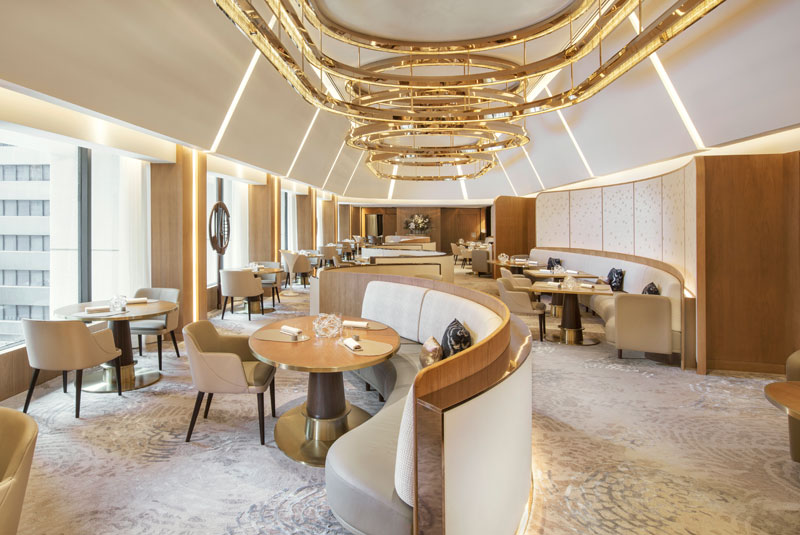
Amber's interior
The chef recalls that one day, he measured the amount of butter, cream and milk used in a full Amber tasting menu and put the equivalent quantities of raw products on a tray to show the team. “We asked them: if you were shown this tray of dairy products before the meal, would you still be interested in eating it? Everybody said no, so we decided we needed to change the way we cooked,” he says.
Driven by the desire to create high-end food that doesn’t only taste good, but also makes diners feel good, Ekkebus and his team conceived a new dairy- and gluten-free menu for Amber, which they launched at the reopening in May 2019. It was a clean break from the accepted conventions of high gastronomy and thus also a risk, but the team was set on creating an experience that would spread the benefits of a balanced diet to all of Amber’s guests.
“We are dinosaurs in this industry,” says the chef. “We are doing what we have always been taught: that a good sauce has a little bit of cream or a little bit of butter. It's up to us and our generation to break through these preconceived ideas and show that there are other ways of getting from A to B. This process pushed us to be more creative, but also to have a product that is lighter and more delicate, and much more flavourful.”
During the four-month closure, the Amber team worked around the clock to find healthier, plant-based alternatives to the dairy products used in many of the dishes, such as the signature sea urchin, lobster, cauliflower and caviar dish, which featured butter, milk and cream. Through research and tests, they came up with a new recipe in which the cauliflower is braised in coconut oil, deglazed in almond milk, then cooked, puréed and mixed with a whipped cream made from enriched soy.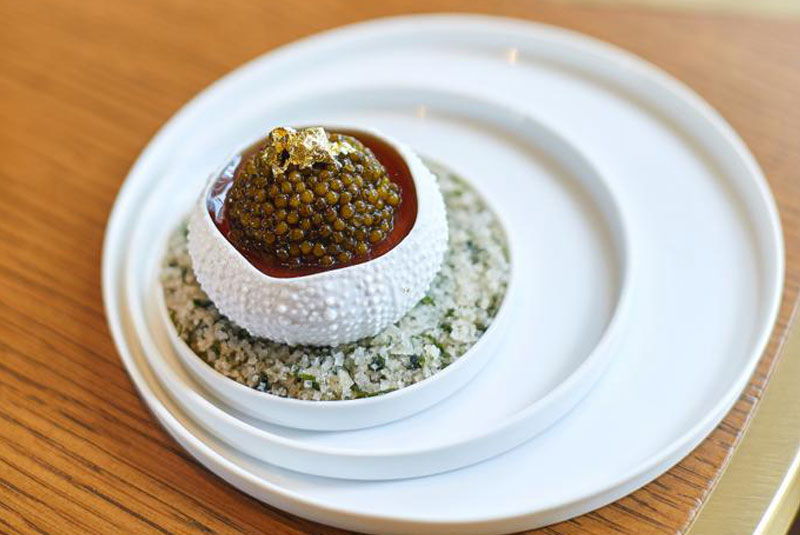
Aka sea urchin, lobster jelly, cauliflower, caviar and crispy seaweed waffles
“This showed us that by using plant-based products, we could get better and more unique flavour profiles,” says Ekkebus. “It wasn't only a better thing to do from an ethical and health perspective – it also tasted better.”
Ekkebus calls himself a “professional eater” – like many cooks, he has always enjoyed eating out, and with as many as eight of Asia’s 50 Best Restaurants found in Hong Kong, he’s spoilt for choice. But he also realised that too often, tasting menus made him feel uncomfortably full and low on energy. Avoiding this became his final target.
“At Amber, we created a tasting menu that instead of making you feel tired and full, gives you energy,” he says. “After eating at the restaurant, you feel like going out to dance or to make love to your partner. Or you have a business lunch and you suddenly find you're productive after that, instead of wanting to go for a nap. We are showing that indulgence and health can go hand in hand.”
Step two: Debating ethics
Amber – which is located inside The Landmark Mandarin Oriental hotel in Hong Kong – has become a fine dining institution in its 15 years, but it has also retained a maverick streak. “Amber has always been a forward-thinking and disruptive restaurant,” says Ekkebus.
“Last year, I felt that it was time to be disruptive again and to question why we were doing things a certain way. After many years of signs pointing to global warming, we realised that if we reinvented the restaurant, it needed to be in sync with nature and with bigger respect towards our carbon footprint.”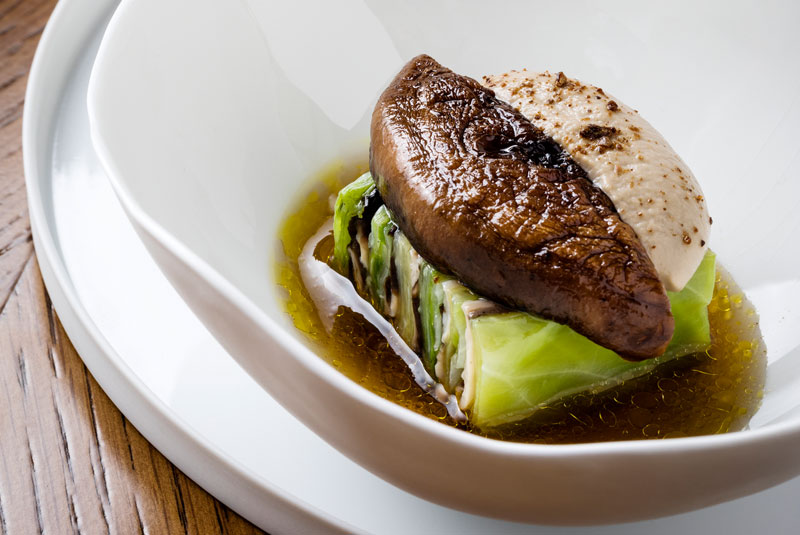
Pointed cabbage, shiitake, virgin black sesame oil and button mushroom
Amber’s menu is now 50% plant-based, while the other half still features small quantities of animal proteins. “The majority of the problems we are facing are due to industrial farming. If we had a richer plant-based diet, we would be operating in a much more sustainable model and reducing the amount of polluting outputs in our environment,” says Ekkebus.
The chef doesn’t hide that the last 12 months have marked a difficult period for Hong Kong. Months of protests and unrest in the city in 2019 were followed by economic uncertainty and travel bans since the beginning of 2020 in response to the coronavirus pandemic, with both resulting in a decrease of international tourists and diners.
The pandemic, however, has also helped show Ekkebus that change is more necessary than ever. “If we look around us, the whole world is taken hostage by a virus that has been generated potentially through industrial farming and wrong practices. Some people say Covid-19 was a result of eating some rare and endangered species of animals, which of course needs to stop, but we have also seen many other diseases in the past that were due to industrial farming.
“We have to make a change. We cannot just put our heads in the sand like an ostrich and think these are just viruses. They came from somewhere, so change is needed. We are now in an era when we cannot deny this.”
Change, according to Ekkebus, means for restaurants to become not only sustainable, but fully ethical. This is the issue that the chef has turned to after Amber became fully dairy and gluten free. “No one really stops and thinks about how milk is produced,” he highlights. “You have to keep dairy cows pregnant non-stop, and while their milk is reserved for us, the calves born of them are often slaughtered and incinerated due to the low demand for veal. Is that really ethical? I'm not battling against the milk industry, but more and more, we will need to think about the ethics of producing certain animal proteins and dairy products.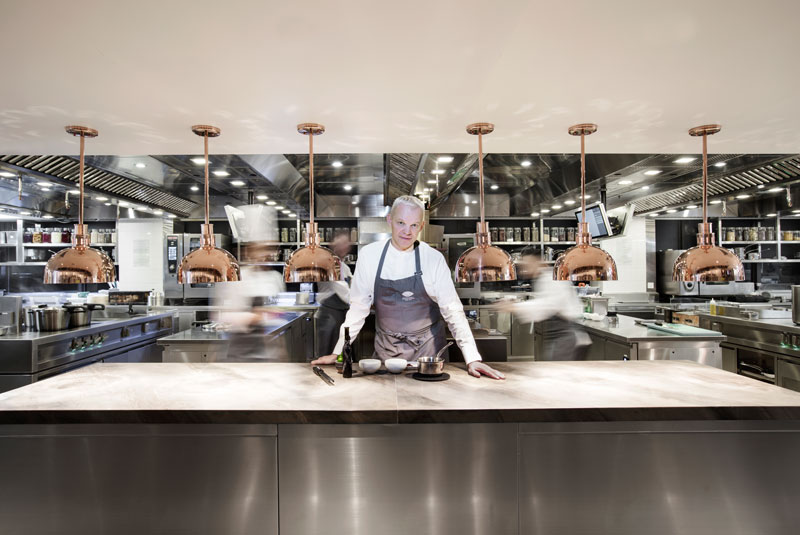
Ekkebus in Amber's kitchen
“In 50 years, with more sophistication and experience, we will ask: was it acceptable to put two chickens in the space of an A3 piece of paper, raise them within six weeks to full-size while pumping them full of antibiotics, and then eat them? Industrial farming doesn't only have huge implications on the environment, but also on our health,” he argues.
This step is the chef’s main challenge and focus for 2020 and going forward. He is trying to source beef that is hormone-free, organically grown and 100% grass-fed. He’s working with fishermen in Hong Kong to source fish responsibly and highlight other types of seafood that may not be as popular, but that are equally delicious. He’s working on sourcing more ethical eggs and importing vegetables from countries closer to Hong Kong to reduce their carbon footprint. “We are trying to close all these gaps,” says Ekkebus.
Step three: Thinking big
Although Amber is his home, Ekkebus always dreamt that the changes he put forward at the restaurant would have a bigger impact – and that’s when being a part of the Mandarin Oriental group of 31 hotels became a launch platform. “We are the troublemakers and the rebels within the group – in every group you need someone to challenge the status quo and look at different ways of doing things better, more diligently or just differently,” he says.
It started with plastic six years ago. When the chef realised the number of piping bags, cling film rolls and other single-use plastics employed at the restaurant, he started a process of research and testing of alternatives to replace them. In 2020, Amber will have eliminated all single-use plastics, and in 2021, the change will be rolled out to all Mandarin Oriental hotels across Asia, America, Europe and Africa.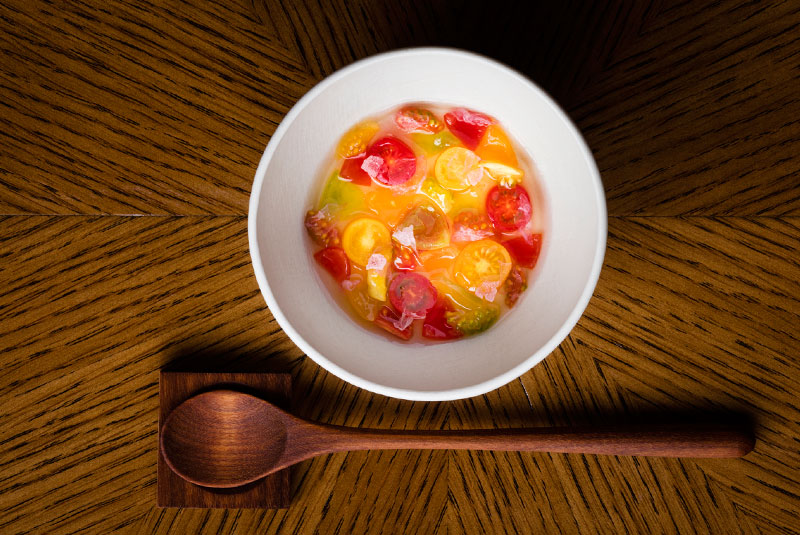
Homemade silken tofu, heirloom tomatoes, salted sakura and virgin almond oil
Among the many efforts that Amber trialled was also the idea to stop using ink cartridges, printers and paper. With the support of Mandarin Oriental, they created a fully cloud-based system accessible through touch screens, whereby they no longer need to print any restaurant tickets – another solution that will be adopted across the group.
Next, they tackled the issue of importing, using and dispensing water bottles. “We created a completely self-sustained system of bottles that are reused, industry washed, sanitised and re-filled on a daily basis inside the hotel,” explains Ekkebus.
Waste is a big issue in Hong Kong, a densely populated city with limited territory, and became even more of an issue around two years ago, when China stopped accepting its waste and the city had to come up with new solutions. “That whole new problem pushed Hong Kong to look into various options to recycle here in the city itself, so it also created exciting new opportunities for the industry,” says the chef.
“At the hotel, we had about 800 kilos of organic waste every day that was basically going to the landfill. Now, we compost it,” he says. “We also have a digestor, so whatever we cannot compost goes into a special machine, it's liquidised, eaten by enzymes and ends up in the sewage, as it can be treated.”
In order to find solutions, Ekkebus started measuring and monitoring the amount and types of waste the restaurant was producing. This allowed him and the team to come up with ways to recycle and reuse much of their waste. “Metal, glass and plastic are recycled, and organic material is composted and used in gardens to fertilise the land. Used oils are recycled into biofuel and used here in our beautiful harbour, so some boats are basically operating on our old frying oils. We found a lot of very creative ideas to recycle the various components of our waste,” he says.
From old kitchen uniforms recycled into coasters and old soap cleaned and donated to NGOs and other charitable institutions, the chef’s problem-solving approach has already birthed creative solutions to a wide range of problems – though he has plenty more in the tank.
Step four: Keep going
Given how far Amber has come from the restaurant that opened 15 years ago, the honour of winning the Sustainable Restaurant Award 2020, sponsored by Beronia, shouldn’t perhaps have been a surprise. But like the Locavore chefs when their restaurant received the award in 2019, Ekkebus’ focus is firmly set on everything there is still to improve.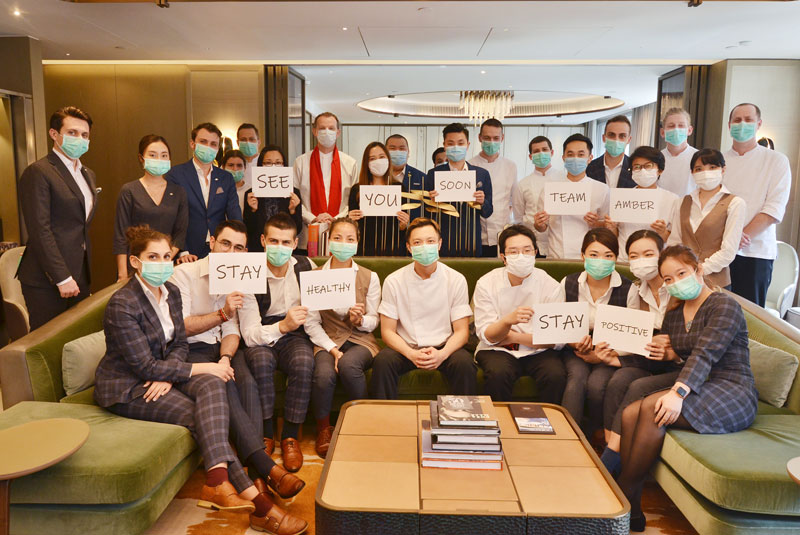
Ekkebus and his team send a positive message from Amber after watching the Asia's 50 Best virtual announcement
“There is so much we can do to become better in what we're trying to achieve and close the gap even further,” he says. “I hope this will inspire other restaurants to shift their focus. We all talk about how we can last in this industry, but I think we need to focus on how we can last without creating so much pain to the environment. If that message comes across, then I'm excited.”
The chef is still set on challenging the preconceived notions of fine dining, including issues around long working hours, equality and maternity leave. He is also working to engage and collaborate with the local community and NGOs – Amber’s Christmas decorations, for example, were created by working with mental health charity Mindset. Amber’s chefs also take turns cooking for Food Angel, a local soup kitchen that prepares meals for the homeless.
“You don’t need to do it on your own,” says Ekkebus. “I would advise every chef and restaurateur to reach out to organisations such as Food Made Good Global [50 Best’s sustainability audit partner]. If you do it on your own, it's a very daunting task and it takes a long time. But if you align yourself with sustainability organisations, it gives you an opportunity to get the assistance you need and better insights into what to do. You can make a true difference.”
Meanwhile, Ekkebus is also planning to write a book on the transformation he was able to drive at Amber. Its concept sums up the chef’s mission in a nutshell. “It will be about how we can redefine cooking by rethinking the process and looking for alternative solutions and ingredients. The message is about how we can look at things differently to operate in a more sustainable manner, but at same time, have something that is absolutely scrumptious, delicious and indulgent.”
Browse the full list of Asia’s 50 Best Restaurants 2020 on the website and discover all the individual awards recognising the work of chefs and restaurants in the region. Follow 50 Best on Instagram, Facebook, Twitter and YouTube for the latest news and initiatives in support of the global restaurant industry.

